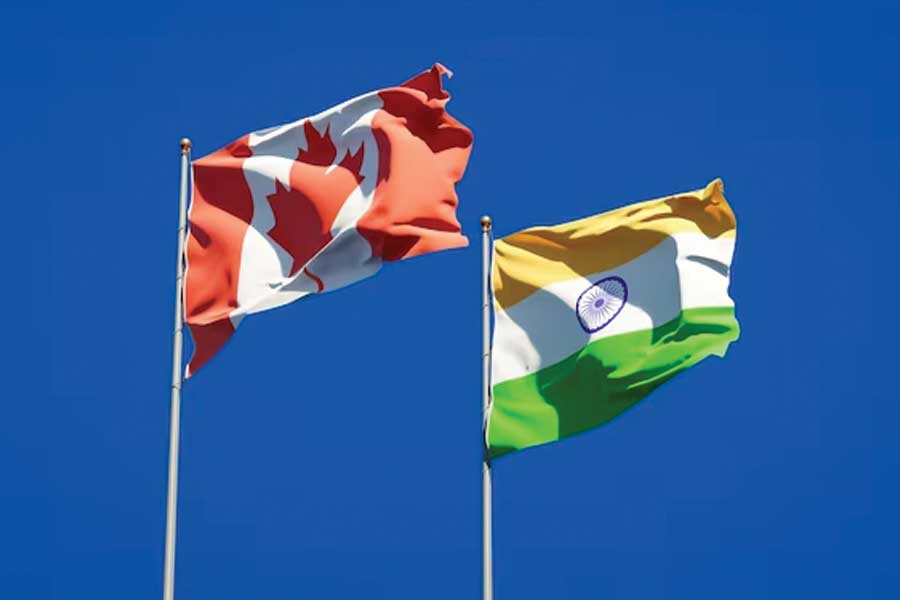Diplomatic tensions between India and Canada have ratcheted even higher with New Delhi announcing it will stop issuing visas to Canadians and also ordering Canada to cut its diplomatic staff in New Delhi.
India said security threats to its staff at its high commission in Ottawa and consulates in Toronto and Vancouver have forced it to suspend the issuing of all categories of visas. Canada is home to 1.5 million citizens of Indian origin.
“Security threats being faced by our High Commission and consulates in Canada have disrupted their normal functioning. Accordingly, they are temporarily unable to process visa applications," External Affairs Ministry spokesman, Arindam Bagchi told reporters. “We will be reviewing the situation on a regular basis,” he said.
The action comes after Canadian Prime Minister Justin Trudeau said this week that Ottawa had “credible” evidence to suggest New Delhi was potentially behind the June parking lot shooting death in British Columbia of Sikh separatist activist Hardeep Singh Nijjar. India has denied the allegation as “absurd.”
Simultaneously, India also gave a clear indication that it intended to escalate its battle with Canada by insisting that the high commission in Delhi should reduce its staffing. “We have informed the Canadian government there should be parity in rank and numbers,” said External Affairs Ministry spokesman Arindam Bagchi. India currently has fewer diplomats in Canada than the Canadians have in India.
Bagchi added that Canada had been interfering in India’s internal affairs and that was one reason for insisting on the downsizing.
About the visa suspension, Bagchi insisted that India had been forced to make the move because of, “the inaction of the Canadian authorities and the creation of an environment that disrupts the functioning of our high commission and consulates. That’s what’s making us stop temporarily the issuance of visas or providing visa services.”
“We have always believed that it is the host government’s responsibility to provide security,” Bagchi said. “The issue is of incitement of violence.”
He added that, “the issue is not about travel to India,” and that people with valid visas and OCI cards would be free to travel to India.
The suspension means that Canadians who don’t already have visas will not be able to travel to India until services resume. In 2021, 80,000 Canadian tourists visited India, making them the fourth largest group, according to India’s Bureau of Immigration. Many are people of Indian origin.
India also insisted that it had not received any further details about the murder of Nijjar from the Canadian Government. “No specific information was shared by Canada on this case. We are willing to look at any specific information that is provided to us, but so far we have received no specific information from Canada,” the spokesman said.
By contrast, he insisted, “from our side, specific evidence about criminal activities by individuals based on Canadian soil has been shared with Canada but not acted upon.”
Bagchi went further and accused the Canadian government of being biased in its actions. “I do think there is a degree of prejudice here. They have made allegations and taken action on them. To us, it seems that these allegations by the government of Canada are primarily politically driven.”`
Today’s actions came in the wake of two-way accusations yesterday and advisories from both countries against travel to the other.
Nijjar’s name appears on a Home Ministry list as a terrorist under India’s Unlawful Activities (Prevention) Act (UAPA). UAPA terrorists. In 2020, the Indian National Investigation Agency accused him of “trying to radicalise the Sikh community across the world in favour of the creation of ‘Khalistan,’” adding that he had been “trying to incite Sikhs to vote for secession, agitate against the government of India and carry out violent activities.”
After tit-for-tat expulsions of diplomats by Ottawa and Delhi, India warned its citizens against travelling to Canada and cautioned Indian international students to be vigilant due to “growing anti-India activities” and “hate crimes and criminal violence” in the country. India’s travel advisory came after Ottawa issued a notice warning travellers to India of the risk of terrorist explosions throughout the country.
Calling the turn of events for Indo-Canadian relations “stunning,” former Canadian diplomat Patricia Fortier said the decision to remove a foreign official from a country is not made lightly, and is taken only if authorities have failed to address a dispute privately.
“In the diplomatic world, this is a very strong step. It lets the other country know the extent of your displeasure,” said Fortier, who was a counsellor at the Canadian Embassy in Washington. The Canadians, however, broke with diplomatic protocol by naming the intelligence officer who was being expelled. Normally, intelligence officers are never named publicly even if there is a diplomatic dispute.
Canada has yet to provide any public evidence of Indian involvement in the killing.
India has criticised Canada for years over giving free rein to Sikh separatists, including Nijjar. New Delhi had accused him of having links to terrorism, which he denied.
At the time of his killing, Nijjar was working to organize the second leg of an unofficial Sikh diaspora referendum on Khalistan that is due to be held next month.
Meanwhile, India’s National Investigation Agency has stepped up its crackdown on Sikh insurgents operating in India. It announced rewards for information leading to the arrest of five insurgents, one of whom is believed to be based in neighbouring Pakistan.











